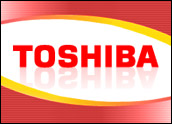
Toshiba announced a 1.8-inch, 40 gigabyte hard disk drive today, touting the technology — the cutting edge of disk drives under development in different sizes from competitors Seagate and Hitachi — as a “first” that would enable consumer electronics devices to store as many as 10,000 songs or 25,000 photos on a single 40GB platter.
Analysts indicated that the new hard drive technology is both fueling and being driven by the success of mobile devices, which are constantly looking to boost capacity in performance at the same time they shrink form factor.
Driving the New Frontier
Analysts also said the new perpendicular magnetic recording (PMR) efforts from the different companies — an approach that achieves greater density by storing data bits more efficiently end-to-end — are the next phase of HDD storage, which will be present in more smaller devices.
“Really, it gives you platters with more capacity; it forestalls the capacity wall,” Illuminata analyst David Freund told TechNewsWorld regarding perpendicular drives. “They’ve got a 1.8-inch platter at 40 gigabytes — that’s pretty impressive. It used to be that large [capacity] at 3.5-inch was impressive.”
Toshiba said its 1.8-inch form factor drives — produced largely for popular MP3 players such as Apple’s iPod — represented the largest single-platter capacity yet, and were now shipping in the company’s Gigabeat F41 player, which can store as many as 10,000 songs.
The company also said the new perpendicular hard disk drive technology would enable other next-generation devices and applications for manufacturers.
“PMR opens the door to products we haven’t even begun to imagine, by removing the technical barriers inherent to packing more data on an HDD,” read a statement from Toshiba Storage Device Division vice president Scott Maccabe.
Everybody’s First
While Toshiba may be first with the 40GB in the 1.8-inch drive form factor, other manufacturers are also packing more capacity into smaller HDDs using the perpendicular approach, according to Illuminata’s Freund.
The analyst said that although latency persists to be a challenge for hard drive manufacturers — testing the time it takes to access and record data as well as the patience of consumers — shrinking down the drives is an appealing way to improve performance.
“So, smaller drives are a better and better idea … not only for the obvious reasons of less power and less heat, [but] add the simple fact that a small platter has more stability at high speeds. It makes sense,” he said.
Freund noted that the perpendicular drive technology was helping to make smaller form factor hard drives more viable, and more competitive with semiconductor and nanotechnology-based alternatives.
Citing the economics of the newer technology, the analyst said more perpendicular drives will likely drive down their cost, similar to what has occurred in larger form factor hard drives.
Freund said the sizes will continue to get smaller, and the perpendicular design may bring about the end of 5.25-inch and 3.5-inch drives.
“The historical cycle will continue until something more disruptive comes along,” he said.
Smaller Size, Larger Stature
Meanwhile, Current Analysis mobile computing analyst Nicole D’Onofrio told TechNewsWorld the perpendicular drive technology is starting to seep into the market and represents the next stage of hard disk drives.
“I think we’re going to see a lot of hard drives shift from standard to perpendicular,” she said. “I think the largest percentage of hard drives will be built on perpendicular technology, the reason being you clearly can store up to 10 times the data on a smaller drive.”
D’Onofrio said that while Toshiba is looking to the handheld market with its 1.8-inch perpendicular drive design, the overall movement to smaller, mobile form factors is fueling the smaller, higher-capacity hard drives. Current Analysis found that notebooks already surpassed desktop retail sales last May.
“We are really seeing strong growth in the mobile form factor,” she said. “That is helping this drive and that is really what’s helping push forward advances in the hard disk drive market.”











































